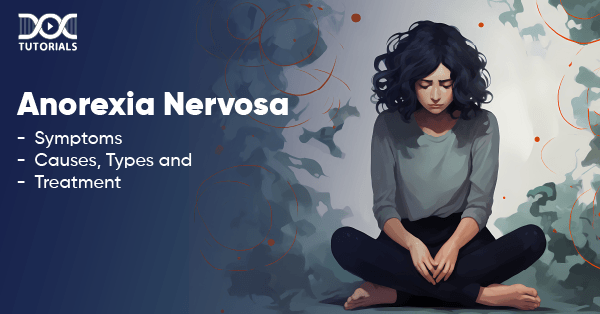Anorexia Nervosa: Symptoms, Causes, Types, and Treatment

As per records, eating disorders are prevalent in above 9% of the world’s population. Anorexia is one such disorder, which is mostly caused due to mental health issues. In most cases, teenagers or those in early adulthood face this disorder due to their intense urge to remain slim. If not treated on time, it can lead to severe complications.
If you are experiencing any obsession with food or body weight, it may be due to anorexia. Knowing anorexia symptoms and causes can help you identify this disorder and opt for the proper treatment method. Here’s a detailed insight into it!
What is Anorexia Nervosa?
Anorexia nervosa, commonly known as anorexia, is a disorder of eating habits. Individuals affected by this condition will restrict their calorie intake, leading to a deficiency of nutrients. It can, at times, lead to extremely poor body weight. Following is a detailed breakdown of the condition:
- People suffering from anorexia often fear gaining body weight and developing a distorted body image.
- Over-obsession with gaining body weight makes them ignorant about the seriousness of their health conditions.
Although being conscious about body weight and calorie intake is quite common in today’s world, anorexia is a disorder which can lead to severe health complications. Thus, it is crucial to learn about the various types and symptoms to facilitate early diagnosis and proper treatment.
What are the Different Types of Anorexia?
Here are the two main types of anorexia:
- Restricting Type
As the name suggests, this type of anorexia will make you restrict your food quantity and type. In this situation, you start counting calories, exercising too much, skipping meals, eating foods of a specific colour, avoiding specific food groups, etc.
- Binge Eating
In this type of anorexia, you will have severe restrictions on your eating habits accompanied by purging behaviours. This includes laxative misuse, vomiting, enemas or diuretics. You may also eat a lot of food at a time and then feel restless.
What Causes Anorexia?
Though the actual reason behind anorexia is yet unknown, as per some research, it is caused by the following factors:
- Physical Factors
It refers to the hormonal changes in your body that control the way in which your mind and body maintain memory, mood, thinking, and appetite. Also, anorexia nervosa can be hereditary as, in some cases, it is passed on to the family members.
- Psychological Factors
It includes seeking control during stressful times, feelings of inadequacy, low self-esteem, anxiety, anger, or loneliness. Troubled relationships and being teased in the past about size or weight can also play a role.
Societal pressure linking thinness with beauty and peer influence further exacerbates the development of anorexia. All these factors can influence the affected person to limit their food consumption to stay beautiful.
- Environmental Factors
Another reason for this condition to grow is cultural influence or environmental factors. Society, as well as the media, has set a standard that compels people to believe that real beauty is to stay slim. This influences an individual so much that they develop conditions like anorexia nervosa.
- Biochemical Changes in the Brain
Changes in brain chemistry, particularly in the reward system and neurotransmitter balance, may contribute to anorexia. Neurotransmitters like serotonin and dopamine influence appetite, mood, and impulse control, potentially affecting eating behaviours.
Imbalances in these chemicals can impact mood regulation and food intake, contributing to the disorder’s development and persistence.
- Genetic Factors
Research indicates that 50-80% of the risk for developing an eating disorder is genetic. Individuals with first-degree relatives who have an eating disorder are 10 times more likely to develop one, highlighting a significant genetic component in the susceptibility to these conditions.
What are the Risk Factors of Anorexia?
The following are the risk factors of Anorexia nervosa:
- Low self-esteem
- Experience of getting bullied due to body weight
- Experience of being criticised due to body shape or eating habits
- Anxiety
- Social or professional pressure to stay slim
- Sexual abuse
- Dieting history
- Obsessive or perfectionist personality
- Racism trauma
- Constant pressure or urge to fit into a different culture
Here are some more risk factors that may increase the chances of anorexia:
- Family history of mental issues or depression
- Type 1 diabetes
- Close relatives with similar disorders, etc.
What are the Symptoms of Anorexia?
Anorexia can lead to physical, emotional, as well as weight or food-related symptoms.
Physical Symptoms
- Dehydration
- Bloating or pain in the stomach
- Suffering from malnutrition
- Constipation
- Weight loss
- Fatigue
- Cold intolerance
- Lanugo (downy body hair)
- Yellowish or dry skin
- Brittle nails
- Infertility
- Hair thinning
Food or Weight-related Symptoms
- Fear of gaining weight
- Change in body shape
- Poor body weight
- Refusing meals despite being hungry
- Obsessive, abnormal, or ritualised eating behaviour
- Too much workout
Emotional Symptoms
- Depression
- Mood swing
- Losing interest in sex
- Grouchiness
How to Diagnose Anorexia?
Diagnosing eating disorders like anorexia involves a comprehensive approach.
Physical Tests
Your primary care provider will conduct a physical exam to assess the following vital signs:
- Blood pressure
- Heart rate
Psychological Tests
A psychological evaluation will also be performed to explore the following:
- Eating habits
- Fears about weight gain
- Body image issues
Laboratory Tests
It includes blood work to check
- Electrolytes
- Liver
- Kidney function
Apart from this:
- Additional tests might assess bone density and heart health to identify potential complications.
- These checkups help rule out other medical causes for weight loss, such as celiac disease or inflammatory bowel disease, ensuring an accurate diagnosis and appropriate treatment plan.
- Referral to a mental health professional may occur for further assessment and treatment.
Treatment Options for Anorexia
The primary objectives of treatment are to restore a healthy weight and establish regular eating habits. A multidisciplinary approach is often used, involving dietitians, mental health professionals, and family members.
- Therapy
Cognitive Behavioural Therapy (CBT) is commonly used to change unhealthy thoughts and behaviours. It helps individuals cope with strong emotions and build healthy self-esteem. Family therapy involves family members in supporting the recovery process and resolving conflicts.
Meanwhile, group therapy provides a supportive environment for those with similar experiences.
- Medication
Although there is no specific medication for anorexia, antidepressants may be prescribed to manage associated anxiety and depression. However, these do not directly address the desire to lose weight.
- Hospitalisation
In severe cases, hospitalisation may be necessary to address medical complications such as dehydration or psychiatric issues. Treatment may include feeding tubes and intravenous fluids.
Challenges in Treatment
Despite these approaches, challenges persist:
- Treatment refusal and drop-out rates are high, and relapse is common.
- Societal stigma and limited access to specialised care can hinder recovery efforts.
- One of the biggest hurdles is the difficulty in recognising the need for help.
- Many individuals with anorexia do not perceive themselves as having a problem, which complicates treatment initiation.
Effective treatment requires a coordinated care team and ongoing support to overcome these obstacles and achieve long-term recovery.
FAQs About Anorexia Nervosa
- What are the complications of anorexia nervosa?
Refeeding syndrome is a serious complication in treating anorexia, occurring when malnourished individuals restart nutrition. It disrupts metabolism, causing life-threatening side effects, and requires medical treatment to manage safely.
- Can we prevent anorexia nervosa?
Preventing anorexia is challenging, but early treatment can be helpful. Encouraging healthy eating habits and realistic body image attitudes in childhood may reduce the risk of developing or worsening eating disorders.
- Are there any long-term health issues associated with anorexia?
Bone problems, such as osteopenia and osteoporosis, are common in anorexia. It can affect up to 90% of individuals, leading to increased fracture risk.
- Is anorexia and bulimia the same?
Anorexia involves restrictive eating, while bulimia involves binge eating followed by purging through vomiting or laxatives. Both are eating disorders with distinct behaviours, though both can lead to serious health complications.
- What are the chances of prognosis in anorexia nervosa?
Untreated anorexia worsens over time and is life-threatening, with increased risks of premature death and suicide. While treatment can restore health, relapse is common, necessitating long-term support from family and friends to maintain recovery.
Conclusion
Anorexia nervosa is a complex eating disorder requiring comprehensive treatment that addresses both physical and psychological aspects. Effective management involves a multidisciplinary approach, including nutritional rehabilitation, psychotherapy, and family support. If you or your loved ones are experiencing the symptoms of anorexia, seeking professional guidance is necessary.
Moreover, if you are a NEET PG aspirant, anorexia nervosa is a crucial topic of your syllabus. Check out DocTutorials for more such topics, top-quality video lectures, faculty-reviewed question banks, mentorship, a Quick Revision Program [QRP], and more. Enroll in our NEET PG course today and secure the top rank!
Latest Blogs
-

NEET PG Exam 2025- Date, Pattern, Marking Scheme, Subject Wise Weightage, and Exam Mode
NEET PG Exam 2025 is the ultimate gateway for medical graduates aspiring to pursue postgraduate courses in medicine, including MD,…
-

INI CET Exam 2025: Your Roadmap to Success – Key Topics, Strategies, and Lessons from Last Year’s Papers
The INI CET exam is more than just a test; it’s a significant milestone for many medical students aiming to…
-

INI CET Exam Success: Previous Year Question Papers & Ultimate Guide – INI CET PYQ
One can feel overwhelmed while preparing for the INI CET (Institute of National Importance Combined Entrance Test). A vast syllabus,…




